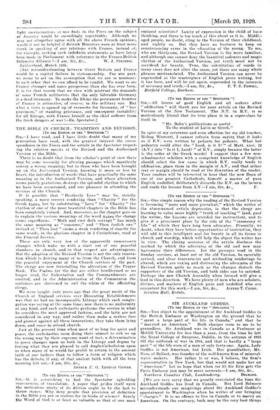THE BIBLE IN CHURCH: TRADITION AND REVISION. [To THE ED/TOR
OF THE " SPECTATOR."] SIR,—I have read, and I have little doubt that many of my generation have read, with the greatest interest the corre- spondence in the Times and the article in the Spectator respect- ing the relative merits of the Revised and the Authorized Version of the Bible.
There is no doubt that from the scholar's point of view there may be some necessity for altering passages which manifestly convey a wrong meaning; but to those who have been brought up on the Authorized Version, knowing it more or less by heart, the introduction of words that have practically the same meaning as in the Authorized Version, and whose alteration seems purely gratuitous, destroys the splendid rhythm to which we have been accustomed, and our pleasure in attending the services of the Church.
It is possible that "Brotherly Love" may be, strictly speaking, a more correct rendering than " Charity " for the Greek Aleffirv, but by substituting " Love " for " Charity" the rhythm of one of the most beautiful chapters in the Bible has been completely ruined. And, moreover, as the chapter goes on to explain the various meanings of the word ky41-1 the change seems superfluous. " Moth and rust doth corrupt" has much the same meaning as "consume," and "Thou foolish one" instead of "Thou fool" seems a weak rendering of exactly the same words, in the glorious chapter in 1 Corinthians, read at the Funeral Service.
These are only very few of the apparently unnecessary changes which wake us with a start out of our peaceful slumbers in church, and in that respect are advantageous. But the adoption of the Revised Version is not the only innova- tion ;licit is driving many of us from the Church, and from the peaceful enjoyment of the Church services of the past. The clergy are now forestalling the alteration of the Prayer Book. The Psalms for the day are either bowdlerized or no longer read, the Exhortation and the Commandments are omitted, and in the Administration of the Communion the sentences are shortened to suit the whim of the officiating clergy.
We were taught sixty years ago that the great merit of the Church of England services over Dissenting Establishments was that we had an incomparable Liturgy which each congre- gation was saying at the same time; now there is no uniformity of any kind, and each ecclesiastic performs the service in what he considers the most approved fashion, and the laity are not considered in any way, and rather than make a useless fuss and piotest against all these innovations, they take them lying down, and cease to attend church.
Just at the present time when most of us long for quiet and peace, the ecclesiastics seem doing their utmost to rub us up the wrong way by their supreme want of tact, a determination to press changes upon us both in the Liturgy and dogma by forcing what they are pleased to call Anglo-Catholicism upon as when many of us would far prefeir to return to the ancient faith of our fathers than to follow a form of religion which has the defects, if any, of that ancient faith with all the true meaning left out.—I am, Sir, &c.,
ARTHUR F. G. LETESON GOWER.




































 Previous page
Previous page